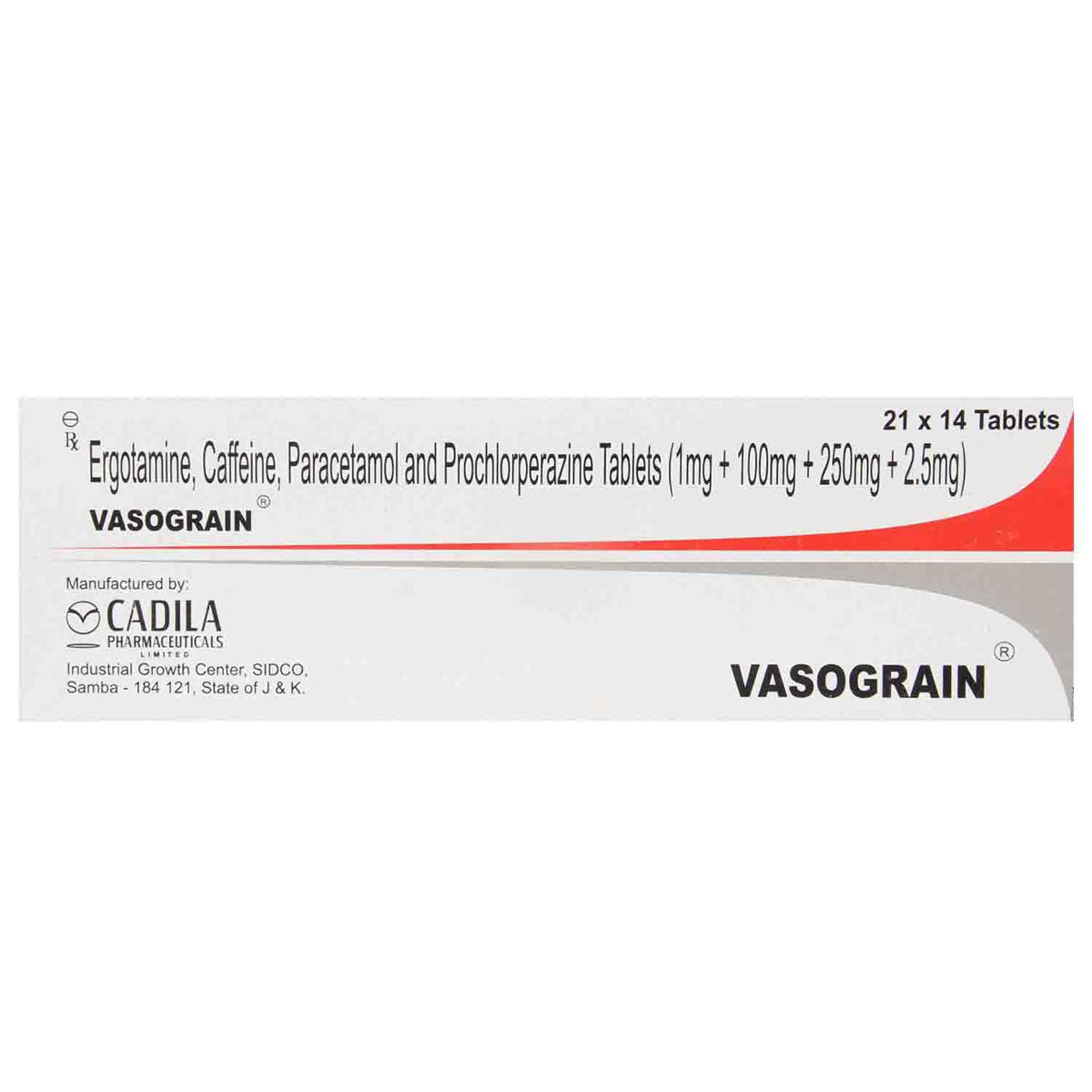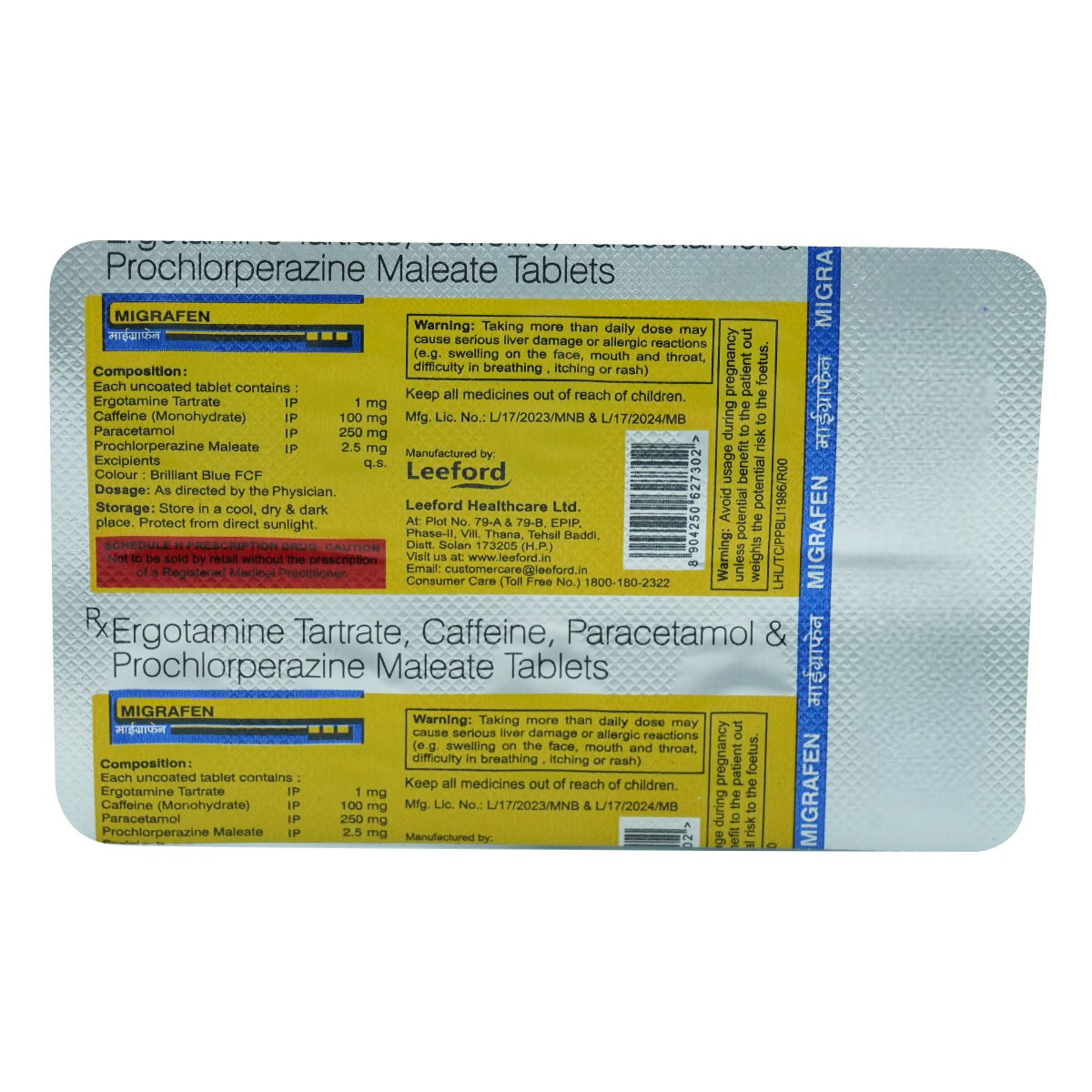Ergotamine
About Ergotamine
Ergotamine belongs to the group of medicines called anti-migraine agents indicated to treat or prevent migraine. Migraine is a neurological condition which is characterised by an intense pulsating, throbbing, pounding, debilitating headache which usually occurs on one side of the head; however, it can occur on both sides or shift.
Ergotamine contains Ergotamine, an ergot alkaloid, which works by narrowing the blood vessels in the brain. This helps reduce the throbbing effects of headaches.
In some cases, Ergotamine may cause side effects such as nausea, vomiting, dizziness, weakness, and numbness. Most of these side effects may not require medical attention and resolve gradually over time. However, you are advised to talk to the doctor if the side effects persist or worsen.
Let the doctor know if you are allergic to any components in Ergotamine. Do not take Ergotamine if you are pregnant or breastfeeding. Please consult the doctor if you have any concerns regarding the usage of Ergotamine in children. Keep your doctor informed about your health condition and medicines to rule out any side effects/interactions.
Uses of Ergotamine
Medicinal Benefits
Ergotamine belongs to the group of medicines called anti-migraine agents indicated to treat or prevent migraine. Ergotamine contains Ergotamine, an ergot alkaloid, which works by narrowing the blood vessels in the brain. This helps reduce the throbbing effects of headaches.
Directions for Use
Storage
Side Effects of Ergotamine
- Nausea
- Vomiting
- Dizziness
- Weakness
- Numbness, tingling sensation
Drug Warnings
Do not take Ergotamine if you are allergic to any of its components or if you are pregnant or breastfeeding. Inform the doctor if you have peripheral vascular disease (circulation problems), high blood pressure, coronary heart disease, sepsis, liver or kidney problems, heart problems, high cholesterol, diabetes, or if you smoke. Avoid taking Ergotamine within 24 hours before or after taking other migraine medicines (ergot and triptan medicines).
Drug Interactions
Drug-Drug Interactions: Inform the doctor if you are taking hormone (epinephrine), cough suppressant (dextromethorphan), antidepressant (venlafaxine, escitalopram), antibiotic (erythromycin), pain killer (tramadol), or anti-migraine agents (sumatriptan, eletriptan).
Drug-Food Interactions: Avoid/limit the consumption of grapefruit while taking Ergotamine.
Drug-Disease Interactions: Inform the doctor if you have cardiovascular diseases.
Drug-Drug Interactions Checker List:
Safety Advice

Alcohol
consult your doctorIt is not known if alcohol interacts with Ergotamine. Please consult the doctor.

Pregnancy
unsafeAvoid taking Ergotamine if you are pregnant. Please consult the doctor if you are pregnant or planning for pregnancy.

Breast Feeding
unsafeAvoid breastfeeding while on treatment with Ergotamine.

Driving
cautionErgotamine may cause dizziness. Do not drive or operate machinery unless you are alert.

Liver
consult your doctorPlease consult the doctor if you have a liver impairment or any concerns regarding this.

Kidney
consult your doctorPlease consult the doctor if you have kidney impairment or any concerns regarding this.

Children
cautionLimited information is available. Please consult the doctor if you have any concerns regarding the usage of Ergotamine in children.
Habit Forming
Diet & Lifestyle Advise
- Maintaining a healthy diet and exercising regularly helps in improving overall health and boosts self-esteem.
- Avoid bright lights, loud noise, and extreme temperatures.
- Perform meditation and yoga. This helps in relieving stress and provides relaxation.
- Follow a regular sleep pattern to improve the amount and quality of sleep you get.
- Massage your scalp to ease the pain.
- Lie down in a quiet, dark room.
- Place a cold cloth over your forehead or neck.
- Avoid smoking, alcohol, and caffeinated drinks.
- Learn what triggers your migraines and try avoiding them.
- Stay hydrated. Drink plenty of fluids.
- Learn relaxation skills as they help in reducing stress.
Patients Concern
Disease/Condition Glossary
Migraine: Migraine is a neurological condition which is characterised by intense, debilitating headaches. Hormonal changes, stress, lack or excess of sleep, bright lights, loud sounds, and certain foods and drinks can trigger migraine headaches. A migraine headache is preceded by warning symptoms one or two days prior to the headache itself. The warning symptoms include food cravings, depression, fatigue, hyperactivity, irritability, and neck stiffness. Symptoms of migraine include throbbing pain in one particular area with varying intensity, nausea, vomiting, numbness or tingling sensation, difficulty speaking, and sensitivity to sound and light.
FAQs
Ergotamine is used to treat Migraine.
Ergotamine works by narrowing the blood vessels in the brain. This helps reduce the throbbing effects of headaches.
Avoid exceeding the recommended dose and duration prescribed by the doctor, as it may raise the chances of side effects. If you have any concerns, if your condition does not improve or if it worsens, consult the doctor.
Do not use Ergotamine for common tension headaches. It is not for daily use and will not treat headache pain.





